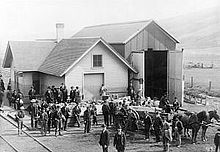Carbon County Strike
The Carbon County Strikes would ultimately fail in its attempt to unionize the coal workers of Utah simply because it "did not have enough support, either internally or externally, to win against a powerful and influential company that effectively played on radical, anti-foreign sentiments in defending its position" but it demonstrated a significant nationwide effort in strengthening unionization in the west.
The UMWA had successfully conducted campaign operations to unionize workers in Pennsylvania, Ohio, Indiana, and Illinois but looked to expand their control over western coal regions in Colorado, Wyoming and Utah.
The UMWA leadership organized recruitment campaigns in Utah and quickly gained a majority of coal miners support in the strike efforts.
As union membership continued to surge throughout the United States, Utah miners saw an opportunistic chance to improve working conditions and gain the right to collectively bargain.
The company tokened the narrative of "worst element of foreigners" in order to justify their claim that only single men without families who recently arrived to the coal fields supported the labor movement and the old time English-speaking miners were against any unionization efforts.
[1] Public opinion was very receptive to the foreign narrative promoted by the Utah Fuel Company and as a result they would continue to not recognize the UWMA.
Even though the UMWA established a solid base with over two-thirds of the Utah miners signing into their union, the efforts to support foreign strikers became a liability in winning over the sympathy of the overwhelming Mormon public.
[1] Cannon did note his concern over the increasing number of union members and worried about a violent clash between the Utah Fuel Company armed guards and the strikers.
Government officials looked over Cannon’s report detailing the lawful protest in Carbon County and decided in a unanimous decision to bring the guard in for security purposes.
The motivation behind sending the entire National Guard was questionable to many in the UMWA and was thought of as a tool to push union influence out of the state.
"[3] LDS Church policy began to reflect the sentiments of the Utah Fuel Company and Mormon members accepted the narrative against the Carbon County Strikes.
The general authority of the church came to the aid of coal companies by encouraging their congregations to protest the Carbon County Strike and act as strikebreakers at mine sites.
[3] For the Utah Fuel Company, influencing the densely populated Mormon community was critical in there effort refute the unions.
Most members in the LDS Church lost sympathy for the Carbon County strikers and the association with Colorado strikes proved to be a liability for their cause.

